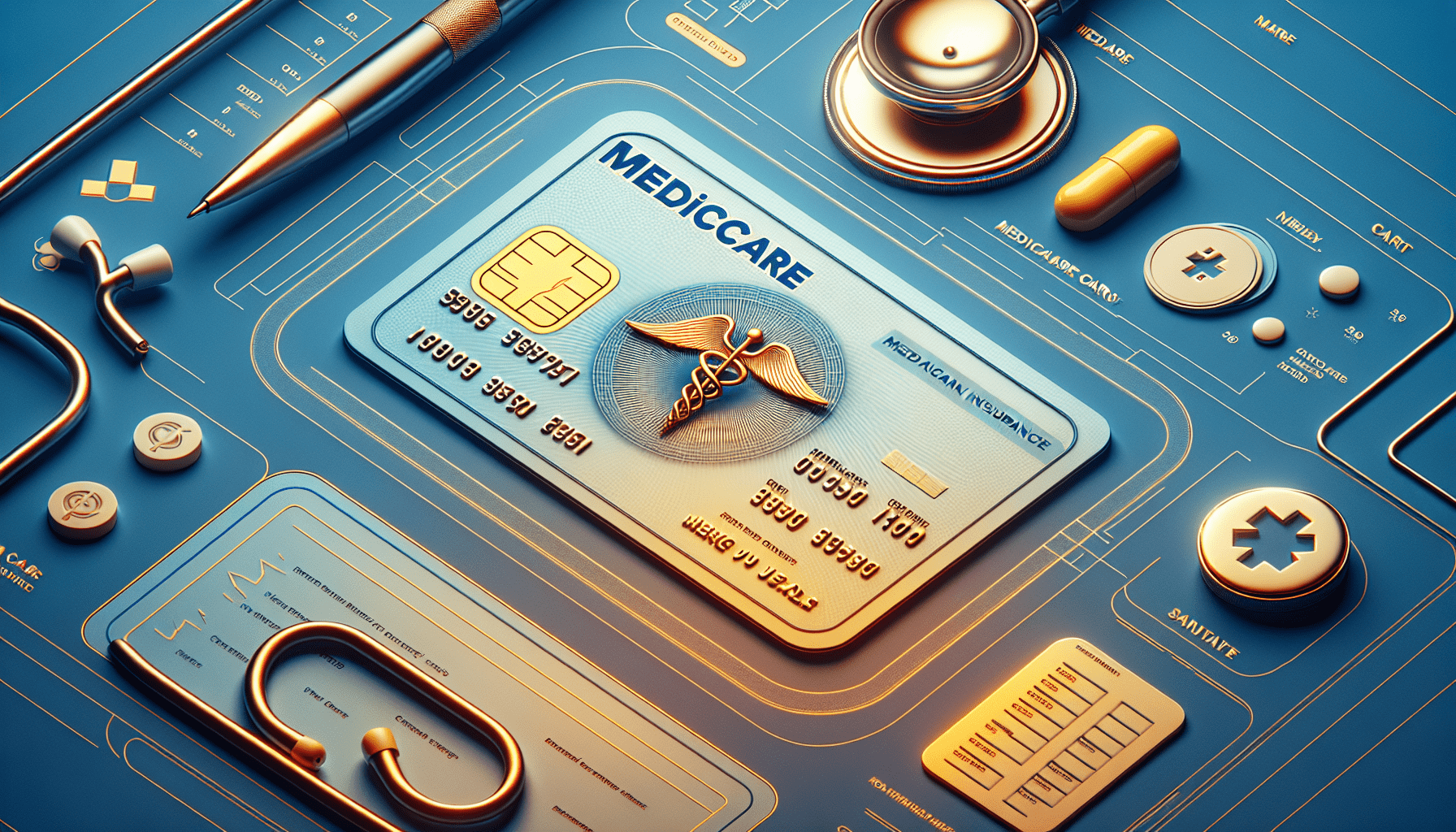Are you ready to navigate the world of Medicare and apply for your benefits with ease? Look no further! In this article, we will demystify the Medicare application process, ensuring you have all the information you need to successfully enroll in this vital healthcare program. Whether you’re a newcomer to Medicare or simply looking for a refresher, we’ve got you covered. So, let’s dive in and unlock the secrets of applying for Medicare!
Eligibility for Medicare
Age requirements
To be eligible for Medicare, you must be at least 65 years old. This is the age when most people become eligible for full Social Security retirement benefits. However, there are some exceptions to this rule. If you have been receiving disability benefits for at least two years, regardless of your age, you are also eligible for Medicare.
Disability requirements
If you have a disability and have been receiving Social Security Disability Insurance (SSDI) benefits for a certain period of time, you may qualify for Medicare before the age of 65. Generally, individuals with disabilities become eligible for Medicare after receiving SSDI benefits for 24 months. It is important to note that there are specific requirements and conditions that need to be met to qualify for Medicare based on disability.
End-stage renal disease (ESRD) requirements
Individuals with End-stage Renal Disease (ESRD), also known as permanent kidney failure, are eligible for Medicare regardless of age. This coverage is available to those who require regular dialysis treatment or a kidney transplant. It is important to consult with a healthcare professional or Medicare representative to understand the specific requirements for enrolling in Medicare with ESRD.
Understanding Medicare Parts
Part A: Hospital Insurance
Medicare Part A, also known as Hospital Insurance, covers inpatient hospital stays, skilled nursing facility care, home health care, and hospice care. Part A is generally available to individuals who have worked and paid Medicare taxes for at least 10 years, or who are married to someone who has. Part A coverage is typically automatic for eligible individuals.
Part B: Medical Insurance
Medicare Part B, also known as Medical Insurance, covers doctor’s visits, outpatient care, preventive services, and durable medical equipment. Part B requires the payment of a monthly premium, and it is optional. However, it is important to consider enrolling in Part B during your Initial Enrollment Period, as delaying enrollment may result in a late enrollment penalty.
Part C: Medicare Advantage Plans
Medicare Part C, also known as Medicare Advantage, is an alternative to Original Medicare (Parts A and B). Part C plans are offered by private insurance companies approved by Medicare. These plans usually include Part A, Part B, and sometimes Part D (prescription drug coverage) benefits. Medicare Advantage plans may also offer additional benefits, such as vision, dental, and fitness programs.
Part D: Prescription Drug Coverage
Medicare Part D provides prescription drug coverage. This coverage is provided through private insurance companies that are approved by Medicare. Part D plans help cover the cost of prescription medications, and the specifics of coverage can vary between plans. It is important to review and compare Part D plans to ensure they meet your medication needs and budget.
Deciding on the Right Medicare Plan
Comparing Original Medicare versus Medicare Advantage
When deciding on the right Medicare plan, it is essential to compare Original Medicare (Parts A and B) with Medicare Advantage (Part C) plans. Original Medicare offers a standardized set of benefits and allows individuals to choose their healthcare providers. On the other hand, Medicare Advantage plans often have network restrictions but may offer additional benefits and coordinated care. Consider your healthcare needs, budget, and preferences when making this decision.
Determining the need for prescription drug coverage
Another important aspect to consider when choosing a Medicare plan is the need for prescription drug coverage. While Original Medicare does not provide coverage for prescription medications, you can enroll in a standalone Part D plan to supplement your coverage. Alternatively, some Medicare Advantage plans include prescription drug coverage. Evaluate your current medications and projected needs to determine if enrolling in Part D is necessary.
Gathering Personal Information
Social Security number
When applying for Medicare, you will need to provide your Social Security number. This is a crucial piece of information that Medicare uses to verify your identity and link your benefits to the correct individual.
Proof of U.S. citizenship or lawful presence
To be eligible for Medicare, you must be a U.S. citizen or have legal immigration status. Documentation providing proof of citizenship or lawful presence, such as a birth certificate or passport, may be required during the application process.
Medicare numbers if applicable
If you are already enrolled in other Medicare programs, such as Part A or Part B, you will need to provide your Medicare numbers. This helps ensure the accuracy and continuity of your healthcare coverage.
Employment information
Medicare may request employment information to verify your eligibility for certain benefits or determine if you are subject to the Part A premium. This information can include details about your work history and coverage from previous employers.
Choosing a Medicare Application Option
Applying online through the Social Security website
One option to apply for Medicare is to complete the application online through the Social Security Administration’s website. This can be a convenient and efficient way to submit your application from the comfort of your own home. The online application will guide you through the necessary steps and provide instructions on any supporting documents that may be required.
Completing a paper application form
If you prefer a physical application, you can complete a paper application form. These forms are available online or can be obtained by visiting a local Social Security office. Once completed, the form can be mailed or delivered to your nearest Social Security office for processing.
Applying over the phone
For those who prefer assistance or have specific questions during the application process, applying over the phone may be a suitable option. You can contact the Social Security Administration’s toll-free number to speak with a representative who can guide you through the application and address any concerns you may have.
The Medicare Application Process
Ensuring all required information is provided
When submitting your Medicare application, it is crucial to ensure that all required information is included. Missing or incomplete information can delay the processing of your application. Double-check to make sure you have provided accurate personal details and any necessary supporting documents.
Submitting necessary supporting documents
Depending on your situation, certain supporting documents may be required along with your application. These documents can include proof of citizenship or lawful presence, Medicare numbers, and employment information. Make sure to submit these documents promptly to avoid any delays in processing your application.
Awaiting confirmation of application receipt
After submitting your Medicare application, it is important to patiently await confirmation of receipt. Medicare will send you notification acknowledging the submission of your application. Keep this notification in a safe place for future reference. If you do not receive confirmation within a reasonable timeframe, it is recommended to follow up with the Social Security Administration.
Understanding the Enrollment Period
Initial Enrollment Period (IEP)
The Initial Enrollment Period (IEP) is the first opportunity for individuals to enroll in Medicare. This period begins three months before your 65th birthday and includes the month of your birthday and the three following months. It is important to note that enrolling during the IEP ensures coverage starts on time and helps avoid any penalties for late enrollment.
General Enrollment Period (GEP)
The General Enrollment Period (GEP) occurs annually, from January 1st to March 31st. If you missed your IEP or did not enroll during a Special Enrollment Period, the GEP provides another opportunity to enroll in Medicare. However, enrolling during the GEP may result in a delay of coverage, with the start date being July 1st of that year.
Special Enrollment Period (SEP)
In certain circumstances, individuals may qualify for a Special Enrollment Period (SEP). SEPs are specific timeframes in which you can enroll in Medicare outside of the usual enrollment periods. Examples of situations that may trigger an SEP include losing employer-sponsored coverage, moving to a new location, or qualifying for certain assistance programs. It is important to familiarize yourself with the criteria for qualifying for an SEP to ensure you do not miss out on these opportunities.
Application Processing Time
Average processing time
The average processing time for a Medicare application can vary. While the Social Security Administration strives to process applications as quickly as possible, it is important to be aware that the timeline can be affected by a variety of factors. On average, it may take up to four to six weeks to receive a decision regarding your Medicare application.
Factors that can affect processing time
Several factors can impact the processing time of your Medicare application. These factors can include the volume of applications being processed, the accuracy and completeness of the information provided, and the need for additional documentation or verification. Delays may also occur during peak enrollment periods or in exceptional circumstances, such as during a government shutdown.
Following Up on the Application
Checking application status
Once you have submitted your Medicare application, it is natural to be curious about its status. To check the status of your application, you can contact the Social Security Administration by phone or visit a local office. They will be able to provide you with updates and any additional information you may need.
Contacting the Medicare helpline
If you have any questions or concerns during the application process, you can reach out to the Medicare helpline. Knowledgeable representatives are available to assist you with inquiries, provide guidance, and address any issues you may encounter.
Resolving any application issues
In some cases, issues or discrepancies may arise during the application process. It could be a missing document or a misunderstanding of certain requirements. If you encounter any problems, it is crucial to promptly address them to avoid delays in processing. Reach out to the Social Security Administration or the Medicare helpline for assistance in resolving any application issues.
Receiving Medicare Enrollment Confirmation
Notification of enrollment
Once your Medicare application is processed and approved, you will receive notification of enrollment. This notification confirms your eligibility and outlines the coverage you have been enrolled in, such as Original Medicare or a specific Medicare Advantage plan. Keep this notification in a secure place for future reference.
Receiving Medicare cards
Medicare will also issue you a Medicare card once you are enrolled in the program. This card will include your unique Medicare number, which you will need when accessing healthcare services. Ensure that you carry your Medicare card with you whenever you seek medical treatment or services.
Understanding coverage start date
Upon receiving your Medicare enrollment confirmation, it is important to review the details to understand when your coverage will begin. The start date of your Medicare coverage will vary depending on factors such as your IEP, GEP, or SEP enrollment period. Understanding this information will help you plan and ensure you have the necessary healthcare coverage when you need it.
Applying for Medicare may seem like a complex process, but understanding the eligibility requirements and following the correct application steps will guide you through the process smoothly. Remember to gather all necessary personal information, consider your healthcare needs, and choose the most appropriate Medicare plan for your situation. Once enrolled, keep your Medicare documents safe and reach out for assistance whenever needed. Medicare provides valuable healthcare coverage, and by navigating the application process effectively, you can access the benefits you deserve.




